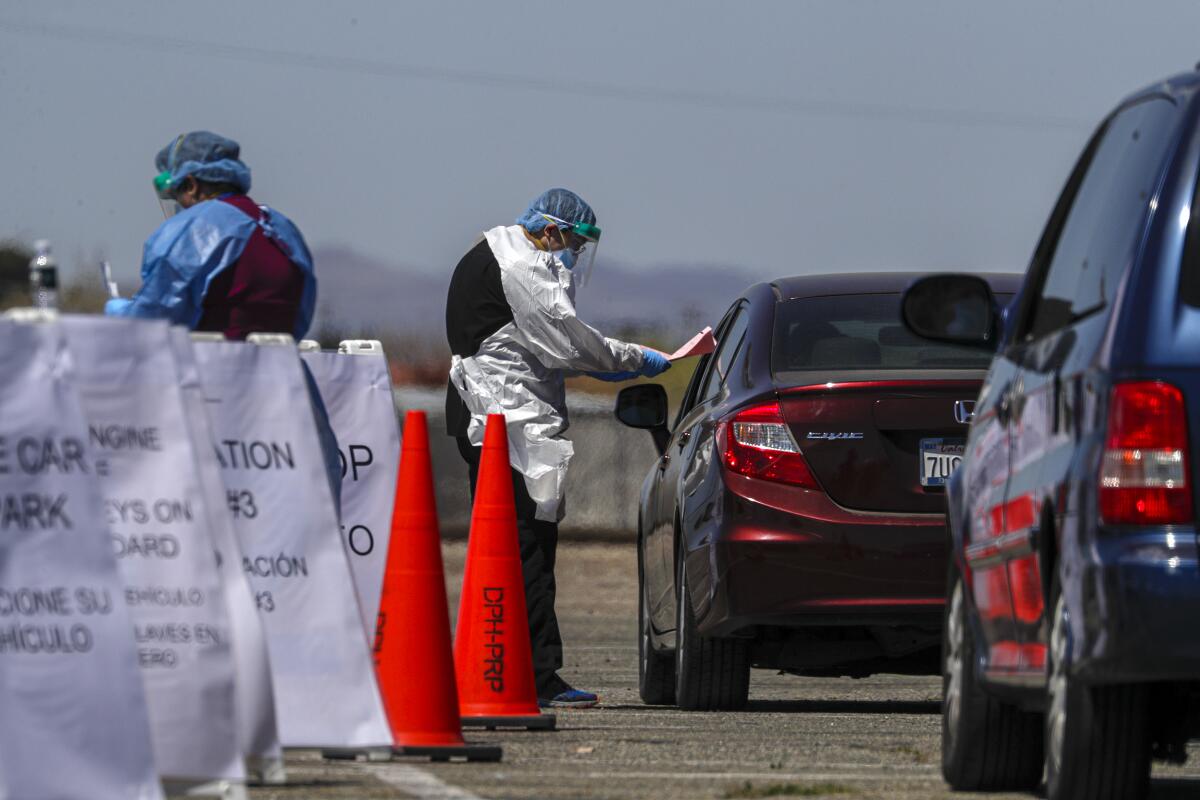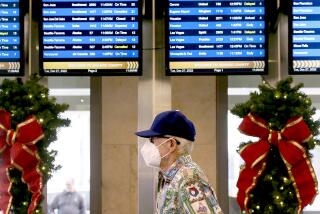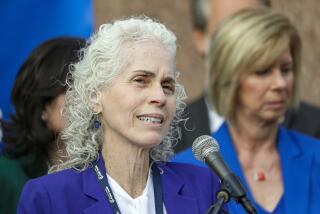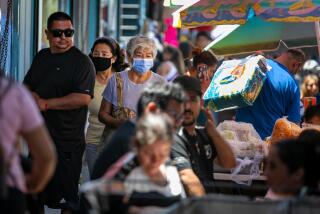Lost wages and jobs haven’t dented support for coronavirus stay-at-home orders, poll finds

- Share via
Nearly half of households in Los Angeles County have lost a job or had their work hours cut, and another 10% have lost other sources of income because of the coronavirus pandemic, but those hardships have not diminished support for the severe social distancing measures imposed by government, a new poll has found.
Ninety-five percent of respondents said they supported L.A. elected officials’ decision to implement a stay-at-home order for all but essential personnel. And 86% said they wanted local authorities to take over hotels and motels if it became necessary to quarantine people most at risk for coronavirus and COVID-19 patients.
Nearly 60% of respondents rated the local government’s response to the coronavirus pandemic as about right, while more than 30% thought government was doing too little. Only 11% thought it was doing too much.
Los Angeles Mayor Eric Garcetti and Gov. Gavin Newsom, as well as the Los Angeles County Health Department, got high marks for their leadership, with 85% or more expressing confidence in each of them. The poll found confidence in President Trump at 38%.
Overall, the responses suggested a dramatic shift in the public’s view of government, particularly at the local level, said Fernando Guerra, director of the Thomas and Dorothy Leavey Center for the Study of Los Angeles at Loyola Marymount University, which conducted the poll.
“We have seen in the last couple of decades a tremendous decline in trust in government,” Guerra said. But, “in time of crisis, we are looking to government for action. People are believing local government and taking action much more than I ever thought would happen.”
The poll also showed a high level of public understanding of the pandemic, Guerra said.
“People are extremely well informed about what is happening,” Guerra said. “They have the level of fear it is a real threat. They are worried about protecting their families, especially the elderly. There is a good understanding of how it spreads. They understand they are vulnerable; 49% of households have someone with a medical condition or over 65. One-fifth of Angelenos don’t have anyone to take care of them.”
High percentages of respondents understood what they could do to protect themselves and others — 76% identified social distancing and 50% hand washing, while 67% said they leave home only for food and supplies.
Only 26% identified wearing a mask as a protection, but that percentage grew during the course of the survey being conducted, as public health officials began to change their policies, advising everyone to wear one or a cloth facial covering in public.
That shift in public opinion, captured in real time by pollsters, provided further evidence that residents of L.A. County are responding to guidance from officials, said Brianne Gilbert, who helped lead the poll.
“When they start talking about wearing masks, people pay attention and understand,” Gilbert said.
Anxiety over the possibility of contracting COVID-19, the disease caused by the novel coronavirus, was high. Eighty-six percent of respondents saw the virus as a threat, and 80% said they worried that they or someone in their household would come down with the disease.
That response was largely consistent across all ages, education and income levels, though those with incomes topping $150,000 were twice as likely as others to think government is doing too much.
Those who identified as politically conservative tended to be more skeptical both of the stay-at-home orders and of the level of threat posed by the virus. Only 76% of them viewed the virus as a real threat compared with 91% among liberals. Conservatives also saw themselves as less vulnerable, with 74% saying they worried they would catch the virus, compared with 85% of liberals.
Black respondents saw less of a threat to their households and community from the virus, even while aligning with other groups on whether it is a threat to the region and country.
The survey, conducted from March 23 to April 8, largely reflected attitudes before reports emerged about black Americans dying of COVID-19 in disproportionate numbers, particularly in Milwaukee, Chicago and New Orleans. Los Angeles County this week also released preliminary demographic data that showed a similar trend.
The high death rates have largely been blamed on longstanding disparities within the healthcare system, along with disproportionate rates of chronic health conditions, including hypertension, asthma and diabetes.
In the poll, only 68% of black respondents said they worried the virus would affect their household compared with more than 75% for all other racial and ethnic groups. Among all groups, including blacks, more than 90% thought the virus would affect the L.A. region.
The findings might be a related to a myth circulating on social media in recent weeks that black people are immune to the coronavirus.
The poll also reported that blacks had the lowest rate of job loss or reduction in hours at 36%. For white residents, the rate was 42%. Nearly 54% of Latinos said they had their hours reduced or eliminated altogether.
Garcetti addressed that in a Thursday briefing, saying black residents in L.A. County are over-represented in government jobs that keep them exposed in public.
“African Americans were less likely to have lost their job, or their hours, and that’s a reflection I think that African Americans work in these critical professions that are on the line in government,” he said, citing numbers from the poll given to him in advance.
Of the 95% who said they supported stay-at-home orders, three-fourths said they strongly supported it.
“It’s just very strong opinion,” Gilbert said. “You see that trend throughout all the questions.”
The poll, to be formally released on Saturday, surveyed 2,000 households in Los Angeles County. It had a margin of error of 2.2%.
Times staff writer Emily Alpert-Reyes contributed to this article.
More to Read
Sign up for Essential California
The most important California stories and recommendations in your inbox every morning.
You may occasionally receive promotional content from the Los Angeles Times.











